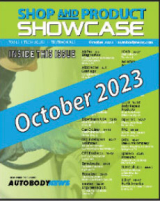Over the years, I have interviewed a lot of collision repair professionals as they retire from the industry. If someone can work in this business for 30, 40 or even 50 years, it’s obviously an impressive run.
But when I heard Felix Cano Sr. of Texas retired after a 67-year career as a metal technician, I was shocked and pleasantly surprised.
Longevity is always a factor with technicians or painters. They need to be adaptable and willing to learn, and---maybe most importantly---they need to be durable.
The physical work associated with these jobs is what often becomes the deciding factor. The average veteran body man ends up experiencing injuries and wear and tear to his body over the years, and it adds up.
When Cano entered the industry at age 16, he knew nothing, but at $8 an hour, he was the richest kid in school. He started out working for a collision center for a Chevy dealership in Texas as a body man’s helper. To say the learning curve was steep is a major understatement.
“I learned fast and the guys I worked with were willing to teach me,” Cano said. “Bondo wasn’t even around back then, so I was doing mostly lead work. The cars back then didn’t have all of the plastic that they have now and fixing them was more straightforward. Today, you have to scan the vehicles and techs are more like computer programmers compared to what we did.”
Life wasn’t always a walk in the park for Cano and his family, as his father worked multiple jobs with the economy struggling. At one point, his parents and two siblings were one step away from homelessness.
“For three weeks, we lived in our car, an old Bonneville, under a tree,” he said. “We bathed in an ice chest and it was a tough period. My first pay check was $488 for one week, and I thought I was wealthy. We got an apartment and things got better.”
The only problem was Cano’s parents moved the family into an apartment where children were not allowed.
“We had to hide the kids from the landlord so he wouldn’t find out,” he said. “We hid in the closet and under the bed. The apartment manager knew what we were doing, but he...
...covered for us. After a while, my dad got enough money to buy a brand-new home for $40,000.”
Wherever he worked, Cano was well-liked and highly respected, according to his son, Felix Cano Jr., who had a long career as a tech himself and is a collision tech teacher today.
“When he was working for Chuck Fairbanks Chevrolet in DeSoto, TX, Mr. Fairbanks asked him to rebuild his personal car and was often recruited as a ringer for the company golf tournaments,” Cano Jr. said. “Dad was a decent golfer, so Mr. Fairbanks always wanted him as a partner. My father would also cook breakfast every Wednesday for the whole crew, regardless of where he worked. It was chorizo, bacon, eggs, tortillas---a big spread---and he usually paid for the whole thing himself.”
Cano Sr. was working at three auto body shops at the time, repairing high-end luxury cars like Porsches, Ferraris and Lamborghinis. His average workday started at 7 a.m. and often ended at 2 a.m., he said.
“I learned how to do the lead work and realized that I had a skill that was much-needed," he said. "I pretty much was able to set my prices and soon I was taking home $800 to $1,000 every week.” Not bad for a guy in his 20s.
Lead work is a lost art and used primarily by car restorers today, but Cano was able to turn it into a moneymaker over the years.
“It requires more training and practice to perfect and it’s a much slower process,” he said. “Lead seals much better than body filler. You can apply it straight over welds, section locations, pillars or anywhere else where you need a solid seal. Lead will flex well without the metal cracking. Body fillers have improved through the years and they flex as well, but lead is better for flexing without cracking.”
Cano planted a seed and it sprouted when two of his six sons, Felix Jr. and Greg, decided to enter the industry. Felix Cano Jr. has made a name for himself as an...
...award-winning instructor and is known for turning many of his students into winners at SkillsUSA competitions.
The legacy continues with his son, Felix Cano III, who works for a body shop in Texas after learning the trade from his father, grandfather and uncle.
The Canos treasure their roles as teachers. Cano Sr. was an instructor with I-CAR for several years. Just like his son, he’s anxious to share his knowledge and experience with anyone willing to learn.
When Cano Jr. was 8 years old, he started going to work with his father and that’s when he realized he wanted to be like his dad.
“I had one of the best teachers anyone could have and the one-on-one instruction that I have from him was so beneficial,” Cano Jr. said. “I teach my students the way he taught me. One great thing about my dad was that he never yelled at me when I messed up. During all the years I’ve worked by his side, he never got mad and his patience was amazing. What he did for me was better than any apprenticeship because I could ask him questions all the time.”
If it was his decision, Cano Sr. would still be working, he said.
“Everyone wanted me to retire, except for me. But my wife wants me around the house, so what can I do? I go down to the shop every once in a while, to stay connected," he said. "Like many other people who reach retirement age, I don’t want to stay home and die. I want to still be involved.”
Cano Jr. is very proud of his papa and hopes he will live past 100.
“He still wants to give back---that’s just the way he is. He was one of the old school ‘metal men’ from that era; the crème de la crème and true tradesmen," Cano Jr. said. "He turned us into teachers because we wanted to be like him, and we still do!”










Ed Attanasio